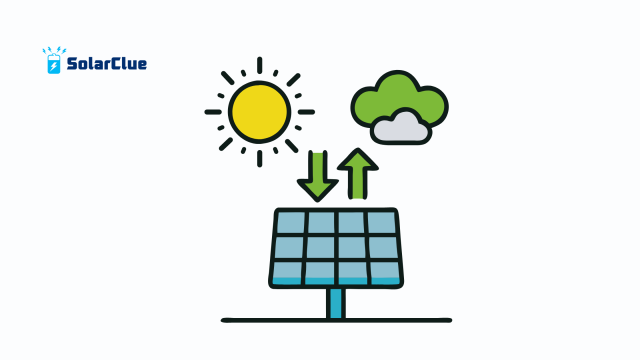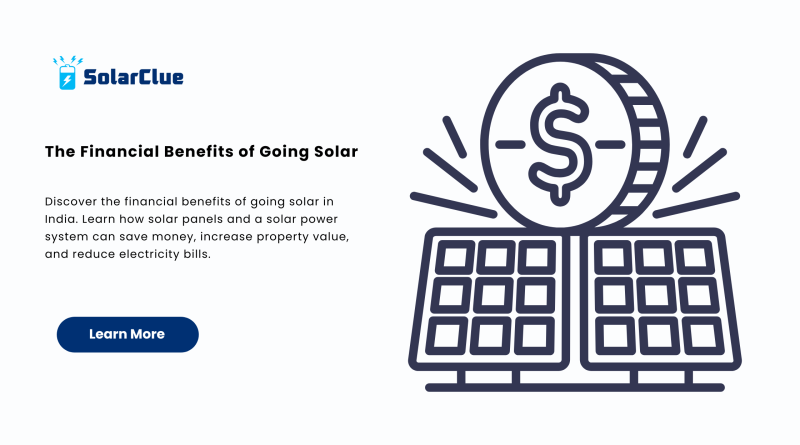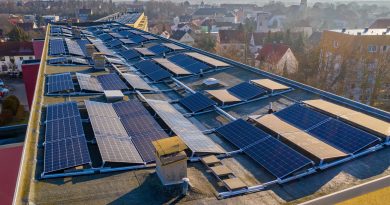The Financial Benefits of Going Solar
Switching to solar energy is no longer just an environmentally responsible move—it’s a smart financial decision too. For Indian homeowners and businesses, the rising cost of electricity combined with decreasing solar panel prices has made solar more accessible than ever. In this blog, we’ll break down the real financial benefits of going solar, how much you can save, and why now is the right time to invest in a solar power system.
Table of Contents
Why Solar Energy Is a Smart Investment
Unlike traditional electricity that comes with monthly bills forever, solar panels offer a one-time investment with long-term returns. Here’s why:
1. Significant Reduction in Electricity Bills
One of the biggest solar benefits is the ability to drastically lower your electricity bills. When you install a solar panel system, you generate your own electricity, reducing dependence on the grid. Over the years, this translates to thousands of rupees saved—especially in states like Karnataka, Maharashtra, Rajasthan, and Tamil Nadu where sunlight is abundant and electricity tariffs are high.
2. Quick Payback Period and Long-Term ROI
The average solar power system pays for itself in 4–6 years, depending on the size of the installation and government subsidies. After the payback period, all the electricity it generates is essentially free. And since most solar panels have a lifespan of 25 years or more, that’s nearly two decades of savings!
3. Government Subsidies and Incentives
The Indian government actively promotes the adoption of solar energy through subsidies and incentives. Under schemes like the PM Surya Ghar Yojana, homeowners can avail up to 40% subsidy on rooftop solar panel systems. In some cases, you also get tax rebates and zero-interest loans to make installation more affordable.
4. Increase in Property Value
Homes with solar panels are seen as energy-efficient and future-ready. This translates to better resale value. Buyers are increasingly aware of the solar benefits and are willing to pay a premium for properties with lower utility costs.
5. Net Metering: Earn from the Grid
Net metering allows you to sell excess electricity generated by your solar power system back to the grid. This means you not only save money but can also earn credit from your utility company. In some states, these credits roll over and can offset your bills for months with lower sunlight.
6. Protection Against Rising Electricity Rates
Electricity tariffs in India have been rising steadily. Investing in solar panels helps you lock in your energy costs. No more surprises when the rates go up—your solar energy system shields you from inflation.
Cost vs Savings: Is Solar Worth It in India?
Let’s break it down with a simple example. A 3kW solar panel system, suitable for a small home, costs approximately ₹1.5–2 lakhs after subsidies. This system can save ₹3,000–₹4,000 monthly on electricity bills. That means you could recover your investment in just 4–5 years, and save over ₹10 lakhs over 20 years.
The financial returns are even higher for larger systems or commercial installations. Businesses, schools, hospitals, and factories using solar energy benefit greatly due to high energy usage and power costs.

Additional Solar Benefits Beyond Money
While the financial perks are clear, there are bonus solar benefits worth considering:
-
Low maintenance: Solar systems require minimal upkeep
-
Clean and silent operation: No noise or emissions
-
Energy independence: Less dependency on the grid
-
Environmental impact: Reduction in carbon footprint
Tips to Maximize Financial Returns from Solar
-
Choose the right system size: Over-sizing may increase cost without benefit; under-sizing won’t save enough.
-
Install on a shadow-free roof: Ensure maximum sunlight for better generation.
-
Compare quotes: Always get quotes from multiple vendors to ensure competitive pricing.
-
Use high-efficiency panels: They generate more electricity per square foot.
-
Monitor your system: Use apps or monitoring tools to track performance and optimize usage.
Common Myths About Financial Aspects of Solar Panels
Myth 1: Solar is too expensive for middle-class homes
Reality: With government subsidies and financing options, solar is more affordable than ever.
Myth 2: You won’t save enough to justify the cost
Reality: Even small systems pay for themselves within a few years and offer long-term savings.
Myth 3: Maintenance is expensive
Reality: Most systems require only basic cleaning and annual checks.
FAQs
Q1. How much money can I save by going solar in India?
Savings vary based on system size and location, but typically range from ₹30,000 to ₹50,000 per year for an average household.
Q2. Are there EMI options for solar installations?
Yes, many providers offer EMI and zero-interest financing, especially with government-backed schemes.
Q3. Will solar panels work during power cuts?
Yes, but only if you use a hybrid or off-grid solar power system with battery backup. Standard grid-tied systems shut off during outages for safety.
Q4. What’s the best time to install solar?
The sooner, the better. Electricity rates continue to rise, and the earlier you switch to solar energy, the faster you start saving.
Q5. Do solar panels require cleaning?
Yes, cleaning every few weeks ensures maximum sunlight absorption. Dust can reduce efficiency if left uncleaned.
Final Thoughts
Choosing solar isn’t just about saving the planet—it’s about saving your hard-earned money too. With the right setup, a solar power system can offer decades of reliable, affordable electricity. The combination of government incentives, rising tariffs, and growing awareness makes now the best time to invest in solar energy.
Ready to take control of your electricity bills and make a smarter financial move?
Visit SolarClue.com or explore more tips at blog.solarclue.com and begin your solar journey today—the sun is literally waiting for you!



